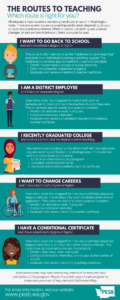Related information: Alternative routes block grant
What are alternative routes?
Alternative routes to teacher certification are designed for career changers and for individuals already working in the school system who want to earn a residency teacher certificate. Compared to a traditional route, where candidates complete their preparation program as part of a bachelor’s or master’s degree, alternative routes allow people to get their teacher certificate through shorter, more flexible, and more affordable programs. Program providers and school districts work together to offer alternative route programs. Individuals can enroll in an alternative route program through a program provider.
The four routes

Alternative route programs prepare candidates to meet the same rigorous standards and requirements as traditional bachelor’s and master’s degree programs. Programs require candidates to seek certification in a geographic or content shortage area, complete a one-year mentored internship, known as a residency, and 540 hours of student teaching.
Route 1: For district staff (e.g., paraeducators) with an associate’s degree
Route 2: For district staff with a bachelor’s degree
Route 3: For “career changers” with a bachelor’s degree
Route 4: For district staff with a bachelor’s degree and a limited certificate
Find an alternative route program
Multiple providers offer alternative route programs across Washington State. Search for alternative route programs using the find an alternative route program tool.
Admission
Program cost
Resources
For future teachers
For program providers
- Alternative route priorities
- Adding or changing an alternative route program
- Memorandum of Agreement (MOA): an agreement created by alternative route program providers in partnership with the school districts; ESDs; and tribal compact, charter, and private schools that outlines the agreed-upon expectations to implement an alternative route program. All alternative route program providers must maintain current MOAs with their partners.
- Alternative route rules
